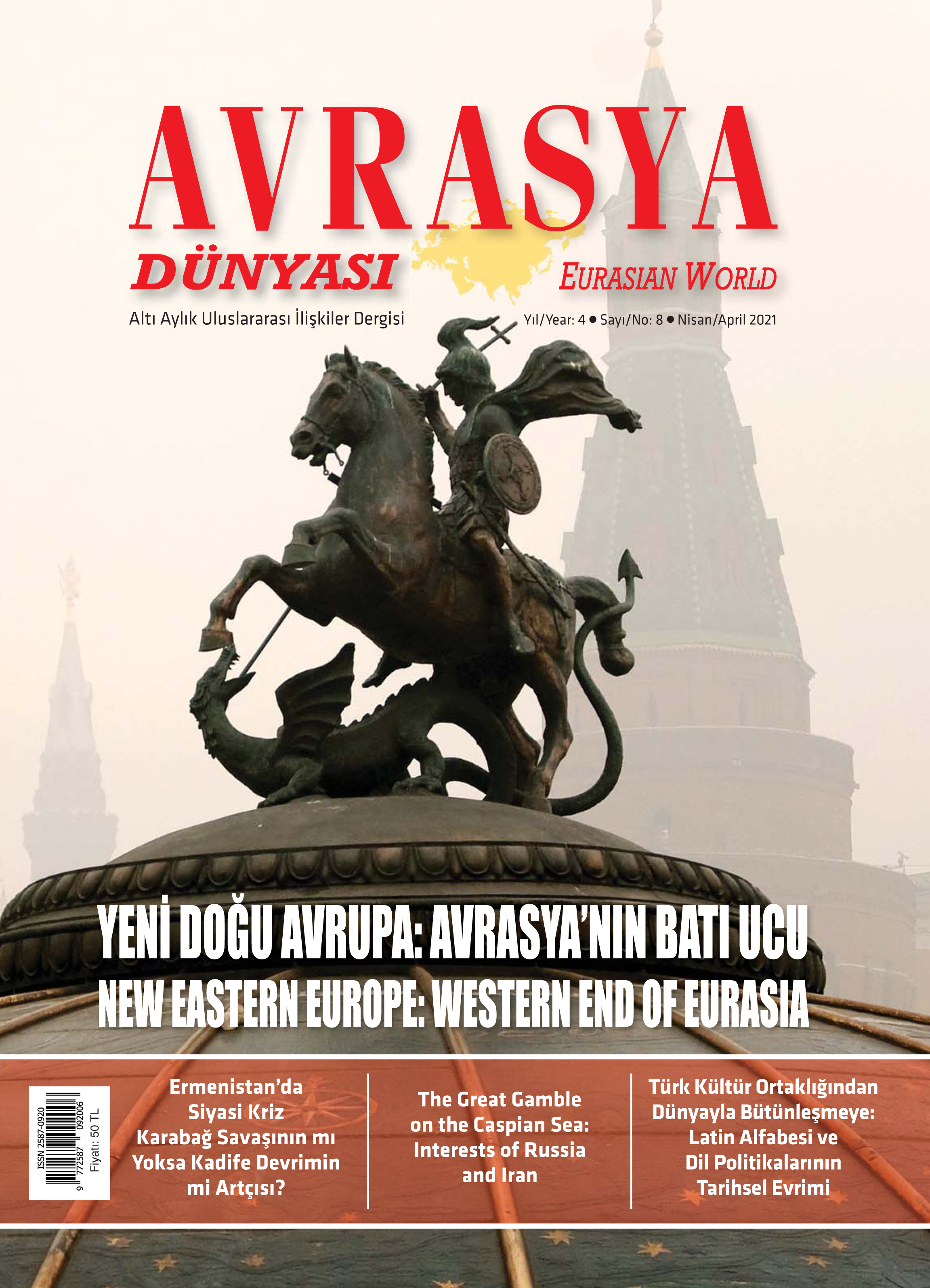Dear Readers,
We appear before you with the 8th issue of the Eurasian World that we have managed to bring out despite all resultant difficulties of the Covid-19 pandemic, which has been the greatest challenge that our ancient world, the survivor of so many crises, has to face after the Spanish Flu that occurred in the beginning of the 20th century. This is the 3rd issue of the Eurasia World that we have published so far during the Covid-19 days. From the start, we would like to apologize for mistakes that we might have made while working under such difficult conditions.
In this issue, we follow the same approach that we employed in our last three issues. Accordingly, we focus on the last sub-region of Eurasia, namely, the ‘New Eastern Europe’ at the western end of Eurasia. As such, Russian Federation, Belarus, Ukraine, and Moldova constitute our area of interest. The boundaries of Eastern Europe have always been a matter of debate. Particularly during the Cold War, Eastern Europe signified the region beyond the developed ‘West’ of Europe. This had changed by the end of the Cold War. In addition to the democratic transitions in former Soviet Bloc countries, some of these countries’ accession to European and Euro-Atlantic structures resulted in the shrinking of ‘Eastern Europe’ and its retreat towards the East, figuratively speaking. This brought about two phenomena that could be designated as the ‘New Central Europe’ and the ‘New Eastern Europe.’ The ‘New Central Europe’ includes the new members of the NATO and the EU. The ‘New Eastern Europe,’ on the other hand, is composed of countries that have not been parties of the integrationist waves in Europe. These are the countries that we have focused on in this issue. As the western end of Eurasia, these four countries confirm the reality that, in geographical terms, the western boundary of our understanding of Eurasia overlaps with the eastern border of the European Union.
With this issue, we finalize our inquiry into the sub-regions of Eurasia aiming to comprehend this wide space. We are grateful for your close attention to our approach. We hope to be with you during our future discoveries on Eurasia, a region that we regard as a treasure in political, economic, social, and cultural terms. We wish all our readers healthy and happy days.
“Ermenistan’da Siyasi Kriz Karabağ Savaşının mı Yoksa Kadife Devrimin mi Artçısı?” Tutku Dilaver
“Yunanistan, Ege’deki Adaların Askersizleştirilmiş Statüsünü İhlâlini Sürdürüyor,” Tugay Uluçevik
“Turkish-Ukrainian Strategic Partnership in the Field of Military Industrial Complex at the Modern Stage,” Denys Moskalyk
“Ukraine’s Approach to the “New Eastern Europe”,” Region Hanna Semenova - Mykola Zamikula
“New Start Anlaşmasının ABD ve Rusya Federasyonu Arasındaki İlişkiler Açısından Önemi,” Ksenia Gökmen
“Ignatiev, Panslavism and Road to the Treaty of San Stefano,” Melih Demirtaş
“Ukraine and Turkey Economic Cooperation: Prospective Challenges or Challenging Prospects?” Tetiana Zosymenko
“The Political Sphere in Armenia in the Aftermath of the 2020 Karabakh War,” Turgut Kerem Tuncel
“Türk Kültür Ortaklığından Dünyayla Bütünleşmeye: Latin Alfabesi ve Dil Politikalarının Tarihsel Evrimi,” Alparslan Özkan
“The Great Gamble on the Caspian Sea: Interests of Russia and Iran,” Olena Kryzhanivska - Sina Nasirzadeh Masouleh
“Azerbaycan’da Reform Süreci ve Şubat 2020 Parlamento Seçimleri,” Bahar Özsoy
Tutku Dilaver (Analyst – Center for Eurasian Studies (AVİM))
Tugay Uluçevik (Retired Ambassador, Ankara)
Denys Moskalyk (PhD Student, Department of Foreign Policy, Center for Foreign Policy Studies, National Institute for Strategic Studies, Kyiv, Ukraine)
Hanna Semenova (PhD Student, Vasyl' Stus Donetsk National University, Vinnytsia & Donetsk, Ukraine)
Mykola Zamikula (Senior Research Fellow, National Institute for Strategic Studies, Kyiv, Ukraine)
Ksenia Gökmen (Eurasian Studies Graduate Program, Middle East Technical University, Ankara)
Melih Demirtaş (PhD Candidate, Area Studies PhD Program, Middle East Technical University, Ankara)
Tetiana Zosymenko (Department of Theoretical and Applied Economy, Chernihiv Polytechnic National University, Ukraine)
Turgut Kerem Tuncel (Senior Analyst – Center for Eurasian Studies (AVİM))
Alparslan Özkan (Eurasian Studies Graduate Program, Middle East Technical University, Ankara)
Olena Kryzhanivska (Ph.D. Candidate, Department of Political Science and Public Administration, Ankara Hacı Bayram Veli University)
Sina Nasirzadeh Masouleh (BA Student, Department of Economics, Ankara University)
Bahar Özsoy (PhD Student, Department of International Studies, Baku State University, Azerbaijan)


